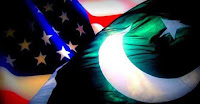Indian Ocean is the oldest and most efficient trade
corridor. On its one side are hydrocarbon rich countries and on the other side
are energy deficient but major energy consuming and industrially developed
countries. The ships carrying goods destined for Europe using Suez Canal also
passes through Indian Ocean. In order to provide security to their maritime
trade navies of different countries are also present in the Indian Ocean. In
the recent past pirates having safe sanctuaries in Somalia have created serious
havoc, which prompted many countries to further enhance their presence in the
Indian Ocean, which also included India.
India not only claims that it is the strongest regional
super power, but also openly denounces any world super power that refuses to
accept its hegemony in the Indian Ocean. India is fully cognizant of the fact that
bulk of the international trade, energy products, consumable and capital goods
pass through Indian Ocean. It is also a fact that India and China have never
enjoyed cordial relationships; in fact they are involved in boarder disputes
for decades. In such a scenario, China has no option but to protect its
maritime trade, particularly movement of energy products. The US Navy is also
active in Indian Ocean and it has been constantly increasing its presence around
Striate of Hurmaz and in the Malacca Striate. In South China Sea dispute, Japan
and Korea are fully supported by the US, which also wishes to contain Chinese
growth.
India has emerged as the biggest opponent of Chinese
program, which is commonly known as ‘String of Pearls’. Under this program
China is building sea ports in various countries and out of these Gwadar is
one. While China says that all these ports fall under the category of ‘Listening
Ports’ that helps in the movement of merchant ships. However, India has been
refuting Chinese claim and call these ‘Chinese Naval Bases’ and term these a serious
threat to its sovereignty.
India is actively operating in Afghanistan, under the
disguise of developmental work. Afghanistan is a land locked country and bulk
of its transit goods having been passing through Pakistan for ages. India often
complains that its Afghan destined goods are not allowed to pass through Pakistan
conveniently. In this backdrop India has invested huge amounts in constructing
Chabahar port in Iran and linking it to the Central Asian Countries via
Afghanistan by road and rail. While the Indian endeavor may succeed in offering
an alternative route, the undeniable fact is that Pakistan offers the shortest
and the most efficient passage to Afghanistan. This fact became most obvious
when Pakistan stopped movement of NATO supplies though land route.
Pakistan decided to handover management control of Gwadar
Port to China and also entered into an agreement for the construction of China Pakistan
Economic Corridor (CPEC). The corridor will link Gwadar with Kashgar and enable
China to contain transit time of its imports/exports. The goods will move
on-land rather than sea. Under CPEC, Gwadar port will be linked to china by
construction of allied infrastructure - road and railway track. India is
opposing construction of CPEC section passing through newly constituted
Gilgit-Baltistan Province of Pakistan.
With the commencement of full scale activities at Gwadar
Port and construction of road and rail networks, Baluchistan is likely to reap
enormous benefits. Over the years India has been supporting rebel groups and
supplying them funds and arms. A banned outfit Jundullah had enjoyed external
support but the group was disintegrated after the hanging of its chief in Iran.
Lately, ‘Free Baluchistan’ banners were seen in Switzerland and analysts
suspect that it is the work of those Baloch groups who have obtained political
asylum there.
One can still recall that India announced to disassociate
itself from Iran-Pakistan-India (IPI) project due to security reasons as the
gas pipeline has to pass through troubled Baluchistan province. Later on, it
dawned that another gas pipeline project, Turkmenistan-
Afghanistan-Pakistan-India (TAPI) was being sponsored by the opponents of
IPI. A point beyond comprehension was
that India decided to quit IPI because of security issue in Baluchistan, but
joined TAPI that has to pass through war-torn Afghanistan.
A substantial part of road network that will ultimately
become part of the CPEC has already been constructed and now it is being
revamped to offer speedy and safe mode of transportation. It is believed that
CPEC will change the entire landscape. India has the realization that it has
missed the opportunity by strangulating its relationship with China. It also
fears that Chabahar port would never be as efficient and cost effective as
Gwadar. Therefore, it is making last ditched efforts to sabotage Gwadr Port and
CPEC projects. Now it is the responsibility of all the Pakistanis to frustrate
Indian efforts and make Pakistan ‘natural corridor for trade and energy’.
This article was originally published in Pakistan & Gulf
Economist





